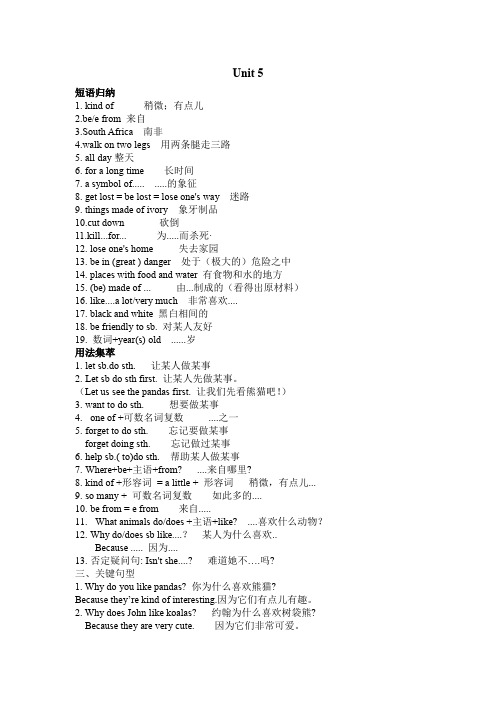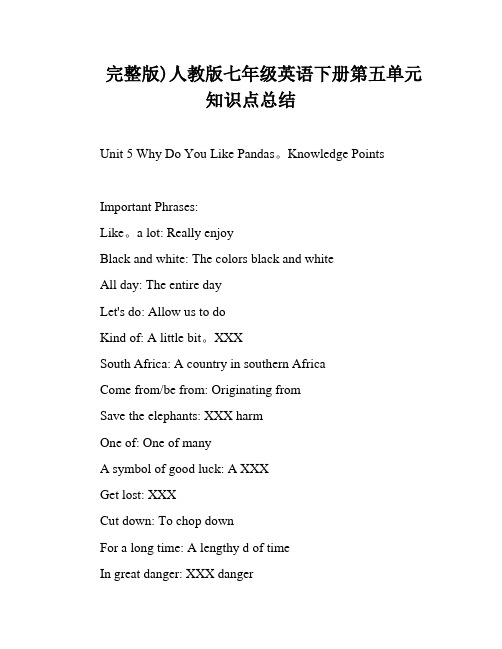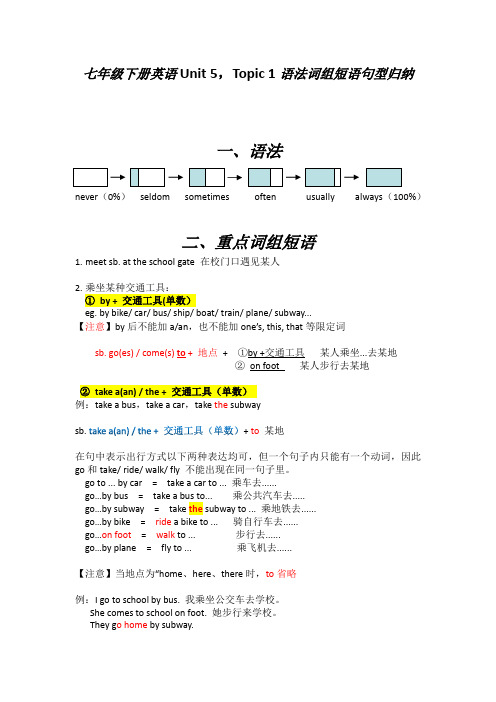七年级英语下册第五单元重点短语及句型汇总
Unit5知识归纳人教版七年级英语下册

Unit 5短语归纳1. kind of 稍微;有点儿2.be/e from 来自3.South Africa 南非4.walk on two legs 用两条腿走三路5. all day整天6. for a long time 长时间7. a symbol of..... .....的象征8. get lost = be lost = lose one's way 迷路9. things made of ivory 象牙制品10.cut down 砍倒11.kill...for... 为.....而杀死·12. lose one's home 失去家园13. be in (great ) danger 处于(极大的)危险之中14. places with food and water 有食物和水的地方15. (be) made of ... 由...制成的(看得出原材料)16. like....a lot/very much 非常喜欢....17. black and white 黑白相间的18. be friendly to sb. 对某人友好19. 数词+year(s) old ......岁用法集萃1.let sb.do sth. 让某人做某事2.Let sb do sth first. 让某人先做某事。
(Let us see the pandas first. 让我们先看熊猫吧!)3.want to do sth. 想要做某事4.one of +可数名词复数....之一5.forget to do sth. 忘记要做某事forget doing sth. 忘记做过某事6.help sb.( to)do sth. 帮助某人做某事7.Where+be+主语+from? ....来自哪里?8.kind of +形容词= a little + 形容词稍微,有点儿...9.so many + 可数名词复数如此多的....10.be from = e from 来自.....11.What animals do/does +主语+like? ....喜欢什么动物?12.Why do/does sb like....?某人为什么喜欢..Because ..... 因为....13.否定疑问句: Isn't she....? 难道她不….吗?三、关键句型1. Why do you like pandas? 你为什么喜欢熊猫?Because they’re kind of interesting.因为它们有点儿有趣。
完整版)人教版七年级英语下册第五单元知识点总结

完整版)人教版七年级英语下册第五单元知识点总结Unit 5 Why Do You Like Pandas。
Knowledge PointsImportant Phrases:Like。
a lot: Really enjoyBlack and white: The colors black and whiteAll day: The entire dayLet's do: Allow us to doKind of: A little bit。
XXXSouth Africa: A country in southern AfricaCome from/be from: Originating fromSave the elephants: XXX harmOne of: One of manyA symbol of good luck: A XXXGet lost: XXXCut down: To chop downFor a long time: A lengthy d of timeIn great danger: XXX dangerXXX ivory: XXXPlaces with food and water: XXX sustenanceKill。
for: To take the life of an animal for a specific purpose1.Seeing Pandas: Observing pandas2.My Favorite Animals: XXX XXX3.e to SP: Greetings to SP4.e Back to SP: Greetings to SP upon returning5.From: Originating from6.In the Zoo: Located in a zoo7.On the Farm: Located on a farm8.My New Pet: XXX9.XXX: Bipedal movement10.Kind of: XXX11.Kind of Interesting: XXX12.A XXX: XXX13.A Little Boring: XXX14.A Kind of: A type of15.All Kinds of: Many different types of16.All Day: The entire day17.A Good Name for XXX: A fitting name for a person18.South Africa: A country in southern Africa19.South China: The southern n of China20.South America: The southern n of the Americas21.America。
人教版英语七年级下册第五单元短语语法要点归纳

人教版英语七年级下册第五单元短语语法要点归纳本文档旨在归纳人教版英语七年级下册第五单元的短语和语法要点。
以下是相关内容的总结:一、短语1. at the weekend - 在周末2. on weekends - 在周末3. watch TV - 看电视4. do homework - 做作业5. go to the cinema - 去电影院6. in the morning - 在早上7. in the afternoon - 在下午8. in the evening - 在晚上9. in the country - 在乡下10. in the city - 在城市11. at the park - 在公园12. go swimming - 去游泳13. play basketball - 打篮球14. take photos - 拍照片15. listen to music - 听音乐二、语法要点1. 一般现在时:表示经常性或惯性的动作或状态。
例如:I watch TV every day.(我每天看电视。
)2. 时间状语:用于修饰句子的时间。
例如:I go to the cinemaon weekends.(我周末去电影院。
)3. 复数名词:表示多个人或物。
例如:I have two cats.(我有两只猫。
)4. 介词短语:用于表示时间、地点等的短语。
例如:I go swimming in the afternoon.(我下午去游泳。
)5. 表示目的的不定式短语:用于表示动作的目的或要做某事的意图。
例如:I go to the park to play basketball.(我去公园打篮球。
)6. 副词短语:用于修饰动词或整个句子。
例如:I often take photos in the country.(我经常在乡下拍照片。
)7. 动词-ing形式:用于表示正在进行的动作。
例如:I am listening to music now.(我正在听音乐。
七年级下册英语Unit5重点短语

七年级下册英语Unit5重点短语七年级下册英语Unit5重点短语英语(英语:English)是一种西日耳曼语支,最早被中世纪的英国使用,并因其广阔的殖民地而成为世界使用面积最广的语言。
下面是店铺为大家整理的'七年级下册英语Unit5重点短语,欢迎阅读与收藏。
【重点短语】1.importance in Thailand 在泰国的重要性2.Let’s see….first.让我们先看...3.favorite animals 最喜欢的动物4.kind of interesting 有点有趣5.South Africa 南非6.be from =come from 来自7.be smart 聪明的8.walk on two legs 用两条腿走9.all day/all night 整天 /整夜10.a good name for her 对于她是个好名字11.like …a lot 非常喜欢......12.black and white 黑白相间13.You’re right.你是正确的。
14.one of +名词复数(......其中之一)15.our first flag 我们的第一面旗16.a symbol of good luck 好运的象征17.draw well 画得好18.forget to do 忘记做某事19.get/be lost 迷路20.places with food and water有食物和水的地方21.be in great danger 处于危险22.cut down 砍倒23.over = more than 超过/多于24.be made of...由…制成25.Thai Elephant Day 大象节【重点句型】1.—Let's see the pandas first.They're my favorite animals. 咱们先看熊猫吧,我最喜欢熊猫了。
七年级下册英语Unit 5Topic1语法词组短语句型归纳

七年级下册英语Unit 5,Topic 1语法词组短语句型归纳一、语法never(0%)seldom sometimes often usually always(100%)二、重点词组短语1.meet sb. at the school gate 在校门口遇见某人2.乘坐某种交通工具:①by + 交通工具(单数)eg. by bike/ car/ bus/ ship/ boat/ train/ plane/ subway...【注意】by后不能加a/an,也不能加one’s, this, that等限定词sb. go(es) / come(s) to + 地点+ ①by +交通工具某人乘坐...去某地②on foot 某人步行去某地②take a(an) / the + 交通工具(单数)例:take a bus,take a car,take the subwaysb. + to某地在句中表示出行方式以下两种表达均可,但一个句子内只能有一个动词,因此go和take/ ride/ walk/ fly 不能出现在同一句子里。
go to ... by car = take a car to ... 乘车去......go…by bus = take a bus to... 乘公共汽车去.....go…by subway = take the subway to ... 乘地铁去......go…by bike = ride a bike to ... 骑自行车去......go…on foot = walk to ... 步行去......go…by plane = fly to ... 乘飞机去......【注意】当地点为“home、here、there时,to省略例:I go to school by bus. 我乘坐公交车去学校。
She comes to school on foot. 她步行来学校。
七年级英语下册第五单元笔记

七年级英语下册第五单元笔记一、重点单词。
1. panda.读音:英[ˈpændə];美[ˈpændə]。
这可是超级可爱的动物单词哦,一提到“panda”,脑海里就浮现出黑白相间、圆滚滚的大熊猫在吃竹子的模样呢。
它是可数名词,复数形式是“pandas”。
2. zoo.读音:英[zuː];美[zuː]。
“Let's go to the zoo.”(咱们去动物园吧),这是个很常用的单词,是动物园的意思,同样是可数名词,复数形式是“zoos”。
注意哦,不是“zooes”,这可不能写错啦。
3. tiger.读音:英[ˈtaɪɡə(r)];美[ˈtaɪɡər]。
老虎,非常凶猛的动物,“tigers”是它的复数形式。
它跑起来可快了,在动物园里看到老虎的时候,都会被它的霸气所震慑。
4. elephant.读音:英[ˈelɪfənt];美[ˈelɪfənt]。
大象超级庞大,是陆地上最大的哺乳动物。
它的复数形式是“elephants”。
大象的长鼻子和大耳朵特别有标志性。
5. koala.读音:英[kəʊˈɑːlə];美[koʊˈɑːlə]。
考拉,澳大利亚特有的动物,整天抱着桉树睡觉,超级萌。
复数是“koalas”。
6. lion.读音:英[ˈlaɪən];美[ˈlaɪən]。
狮子,“the king of the forest”(森林之王),复数形式为“lions”。
狮子吼叫起来可威风了。
7. giraffe.读音:英[dʒəˈrɑːf];美[dʒəˈræf]。
长颈鹿,有着长长的脖子,可以吃到树上很高处的树叶。
它的复数形式有点特别,是“giraffes”或者“giraffe”(单复数同形也可以哦,但“giraffes”更常用)。
8. animal.读音:英[ˈænɪml];美[ˈænɪml]。
这个单词就是动物的统称啦,是个可数名词,复数是“animals”。
七年级英语下册Unit5知识点

七年级英语下册Unit5知识点七年级英语下册Unit5知识点Unit 5 Our School Life Topic1 一、重点词语: 1. wake up 醒来,唤醒 get up 起床 2. go to school 去上学 go home 回家 3. go dancing / shopping / skating / swimming 去跳舞;购物、滑冰;游泳 go doing something 可用于表达去进行某种娱乐休闲活动。
4. 表示交通方式: on foot 步行 by boat 坐船 by ship 坐船 by air 乘飞机 by plane 乘飞机 by train 坐火车 by subway 搭乘地铁 by car 坐小汽车 by bus 坐公共汽车 by bike 骑自行车 5. take the subway / bus / car 搭乘地铁;公共汽车;小汽车 6. drive a car to work = go to work by car 驾车去上班 take a bus to work = go to work by bus 乘公共汽车去上班 go to school on foot = walk to school 步行去上学 7. ride a bike / horse 骑自行车;骑马 8. after school / class 放学以后;下课以后 9. play the piano / guitar / violin 弹钢琴;吉他;小提琴 play basketball / soccer / football 打篮球;踢足球;打橄榄球 play computer games 玩电脑游戏 play with a computer 玩电脑 play sports 做运动 10. next to 紧挨着,在…旁边 11. a plan of my school 一幅我们学校的平面图 12. on weekdays 在工作日 at weekends 在周末 13. have breakfast / lunch / supper / dinner / meals 吃早餐;中餐;晚餐;正餐;一日三餐 have classes / lessons / a meeting 上课;上课;开会 14. watch TV / movies / games / the animals 看电视;电影;比赛;动物 read novels / newspapers / books 看小说;报纸;书15. wash one’s face / clothes 洗脸;衣服 16. 反义词:up �C down, early �C late 近义词:quickly �C fast get up early 早起 be late for 迟到 17. the first / second / third / fourth day 第一;二;三;四天 18. clean the house 打扫房子19. 表示建筑物(尤其学校建筑物): on the playground 在操场 at school / home / table 在学校;家里;桌旁 in a computer room / teachers’ office / classroom building / gym / library / lab / canteen 在电脑室;教师办公室;教学楼;体操馆;图书馆;实验室;食堂20. around six o’clock = at about six o’clock 大约在六点 21. 频率副词:never, seldom, sometimes, often, usually, always 二、重点句型:1. It’s time to get up. 该起床的时候了。
人教版七年级下册英语第五单元短语用法总结

人教版七年级下册英语第五单元短语用法总结1. catch up with意思:追上;赶上用法:该短语通常用于指在某个方面追赶或赶上他人或某种研究进度。
例句:She ran as fast as she could to catch up with her friends.2. fall behind意思:落在后面;掉队用法:该短语通常用于指在某个方面落后于他人或某种研究进度。
例句:I need to study harder so that I don't fall behind in class.3. give up意思:放弃用法:该短语通常用于指在某个目标或行动上放弃努力,不再继续进行。
例句:Don't give up on your dreams, keep working hard.4. work out意思:解决;搞清楚;锻炼用法:该短语可以有多种意思,可以指解决问题或困难,也可以指弄清楚事情的真相,还可以指进行体育锻炼。
例句:We need to work out a plan to solve this issue. / I need to work out the answer to this math problem. / She goes to the gym every day to work out.5. look up意思:查找用法:该短语通常用于指查找某个词语或信息,并且多用于使用字典或互联网等工具进行查找。
例句:If you don't know the meaning of a word, you can look it up in the dictionary or online.6. give out意思:分发;分发完;用完;耗尽用法:该短语通常用于指把东西分发给他人,或指使用完、耗尽某物。
例句:The teacher gave out the test papers to the students. / The batteries gave out and the flashlight stopped working.7. run out of意思:耗尽;用完用法:该短语通常用于指用完某物,使其耗尽。
- 1、下载文档前请自行甄别文档内容的完整性,平台不提供额外的编辑、内容补充、找答案等附加服务。
- 2、"仅部分预览"的文档,不可在线预览部分如存在完整性等问题,可反馈申请退款(可完整预览的文档不适用该条件!)。
- 3、如文档侵犯您的权益,请联系客服反馈,我们会尽快为您处理(人工客服工作时间:9:00-18:30)。
七年级英语下册第五单元重点短语及句型汇总efrom来自于
3.allday整天
4.firstflag国旗
5.getlost迷路belost迷路
6.foralongtime很长时间
7.placeswithfoodandwater有食物和水的地方
8.cutdown砍倒cutintohalf切成两半
9.losetheirhomes失去家园
10.in(great)danger处于(极大)危险之中
11.thingsmadeofivory由象牙制成的东西
12.SouthAfrica南非
二.用法集萃
1.—Why…?为什么……?
—Because…因为……
2.letsb.dosth.让某人做某事
3.wanttodosth.想要做某事
4.oneof+名词复数……之一
5.forgettodosth.忘记要做某事
6.forgetdoingsth.忘记做过某事
7.helpsb.(to)dosth.帮助某人做某事
8.befriendlytosb.对某人友好
三.重点句型1.—Whydoyoulikepandas?—Becausethey’rekindofinteresting.
你为什么喜欢熊猫?因为它们有点儿有趣。
2.—WhydoesJohnlikekoalas?—Becausethey’reverycute.
约翰为什么喜欢树袋熊?因为它们非常可爱。
3.—Whydon’tyouliketigers?—Becausethey’rereallyscary.
你为什么不喜欢老虎?因为它们真的吓人。
4.—Wherearelionsfrom?—They’refromSouthAfrica.
狮子来自哪里?它们来自南非。
5.Thedogcanwalkontwolegs.这狗可以用两条腿走路。
6.Elephantscanwalkforalongtimeandnevergetlost.大象能走很长时间并且从不迷路。
7.Theycanalsorememberplaceswithfoodandwater.它们也能记住有食物和水的地方。
8.Butelephantsareingreatdanger.但是,大象处于极大危险之中。
9.Peoplecutdownmanytreessoelephantsarelosingtheirhomes.
人们砍倒了许多树,因此,大象渐渐失去它们的家园。
10.Todaythereareonlyabout3,000elephants(over100,000before)
现在仅有大约3000头大象(之前超过10万头大象)。
11.Wemustsavethetreesandnotbuythingsmadeofivory.
我们必须拯救森林并且不要买象牙做的东西。
12.Isn’tshebeautiful?她难道不美丽吗?。
